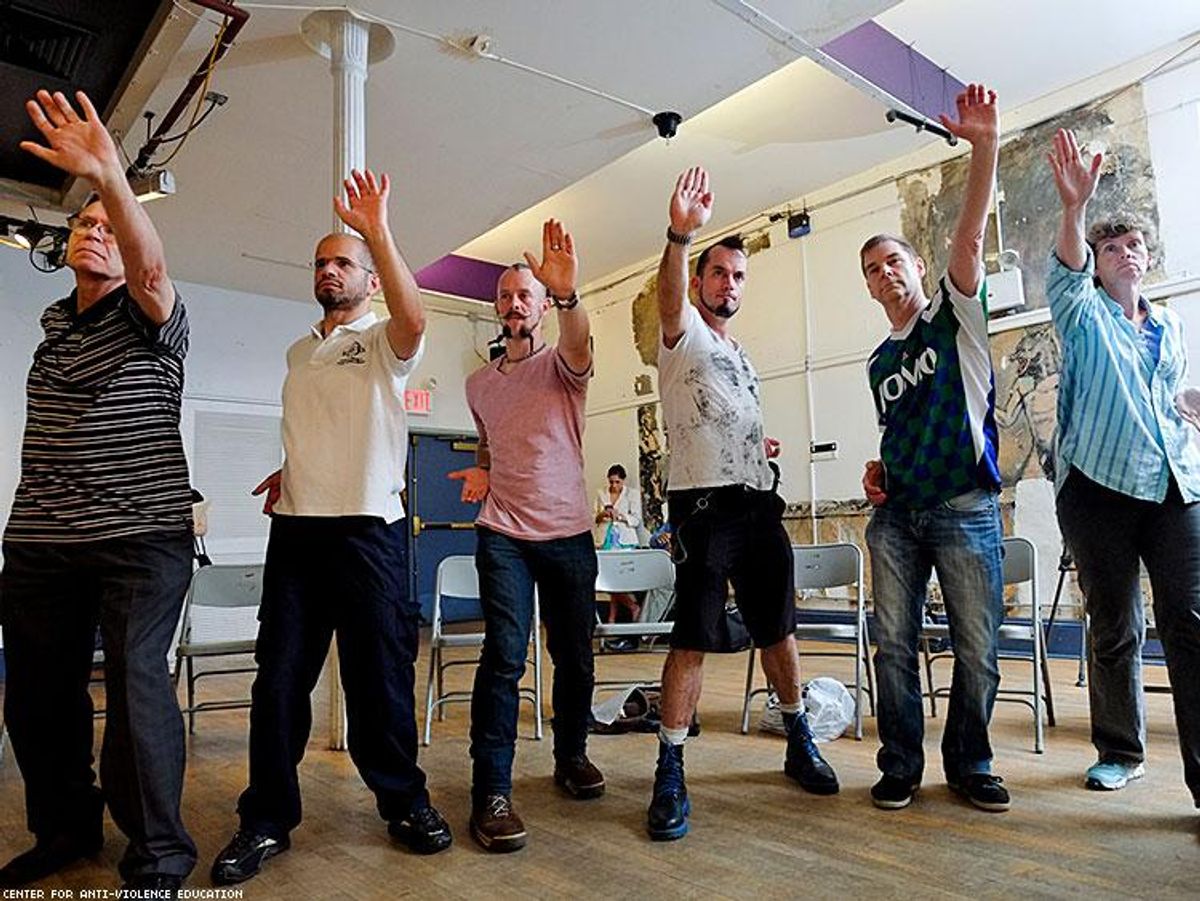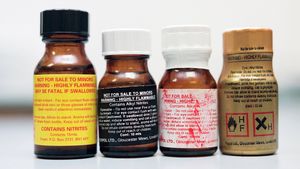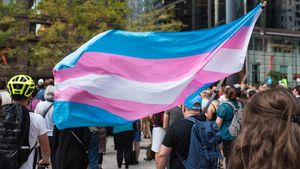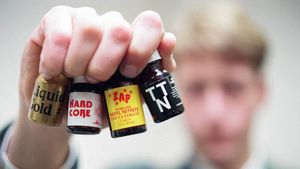At the Center for Anti-Violence Education, we believe that everyone has the right to live free from violence. Self-defense is anything we do -- yelling, running away, negotiating -- to be as safe as we are able, and to survive, in any moment. Self-defense includes many things, including preventing violence, interrupting it, healing from it, and working together to end the systemic oppressions that cause violence -- like racism, sexism, transphobia, and homophobia.
We know that strong verbal skills can help us deal with a wide range of situations, from annoying or intrusive, to threatening and potentially dangerous. Sometimes using verbal self-defense prevents us from having to physically engage to protect ourselves. Communicating assertively, with a clear but nonaggressive message, may also give us the opportunity to deescalate a potentially dangerous situation. Below are some illustrations of the power of our words, and why we recommend speaking up as a first line of defense:
Speaking up can often stop someone who is annoying you. Try to use short statements to cut off conversations that you don't want to continue (e.g. "I don't want to talk to you"). The broken record -- saying the same short statement over and over again -- can be an effective tactic.
If you feel threatened, making a scene by getting loud can sometimes prevent things from getting more dangerous. It's OK to hurt someone's feeling, seem paranoid, or even be wrong. We are usually right when our instincts tell us that something doesn't feel right about a person or a situation.
Yelling is one of the best defenses. It breaks the "victim role," attracts attention, distracts the attacker, and puts you in touch with your power and anger. When outside, yelling "Call 911!" attracts more attention than yelling "Help!" or "Rape!"
In addition to the additional suggestions below, we recommend consulting CAE's LGBTQ safety website, https://safeandproud.org/self-defense-safety. The Center for Anti-Violence Education is also hosting a free self-defense class for LGBT adults Saturday. It will be held at CAE (327 Seventh St., Second Floor, Brooklyn, NY 11215) from 1 to 3 p.m. and combines verbal and physical self-defense skills with discussions on safety, prevention, relationships, and bias crimes. Free child care is available, but you must call first: (718) 788-1775.
A final recommendation is to consider adding some self-defense apps like My Panic Alarm and to keep it up on your screen when walking around at night or in unfamiliar places. Just touch the icon, and this app will attract instant attention from people around you with a super loud alarm, emergency flashing colors, and written help text.
Here are a few unsafe scenarios and suggestions on how to escape them:
You're walking alone in an unfamiliar area and someone starts following you. What do you do?
CAE: If you think you are being followed, try changing your pace or crossing the street. Do not lead a potential attacker to your home. Instead, go to a store, restaurant, or other populated place. If you need to make an emergency phone call, explain the situation and ask to use a phone if you do not have one.
You're walking with a friend in a badly lit area with not much around and someone behind you screams, "Hey, queer!" What do you do?
You can choose to ignore or respond to a verbal harasser, depending on your comfort level. In either case, remain aware of the person or group. Take into account your potential allies in the vicinity, the environment (are there any safer places you could get to quickly?) and your ability to physically defend yourself. If you're harassed when with a friend, partner, or lover, stay physically close (if possible) and communicate with each other. Try to talk about & practice what you both can do in threatening situations before they occur.
A car pulls up next to you and asks you to come over to answer a question. What do you do?
Cars are dangerous. Get away as quickly as possible. If you feel that you want to answer, try to maintain a safe distance between yourself and the car; if the person demands that you approach, this is a red flag to get away to a safer (better-lighted, with more people around) place ASAP.
You're walking to your car alone at night and find yourself lost. What do you do?
Carry yourself in a confident manner -- even if you are lost, scared, or upset. Attackers often seek out people who "appear" vulnerable. If you are approached, respond assertively or leave, keeping an eye on what he/she does. Look for a store or other lighted public place where you can gather yourself and consider your options. A subway station can be a good place to go because they have maps by the token booth, and attendants are often (but not always) present.

Someone who appears to be unarmed runs up to you and demands all your money. What do you do?
It is hard to tell if someone is armed or not. Our advice is to always assume that attackers may have weapons -- even if they don't show them at first -- and if they do, to further assume that they are real, and that they intend to use them. CAE does not advocate fighting against a weapon, except as an absolute last resort. We stress the difference between attacks against your person and your property.
We do not advocate fighting to protect property. However, as with everything in self-defense, you make your own decisions. It's a good idea to think ahead about what you'd give up and what you wouldn't. For example, if an attacker has a gun and demands your money, what would you do? And on to harder choices, involving sexual assault and other kinds of physical attacks. Sometimes you don't have options or alternatives: An attacker may overpower you. You may feel you have to do exactly what the attacker says because you fear for your life. Remember: Self-defense is anything you do to survive. Cooperation (or submission) is not consent. This means that even if you go along as a strategy to stay alive or avoid being injured it does not mean that you agreed. You are choosing a strategy that seems best at the time, to try to make it out of the situation alive.
AFTER AN ATTACK
Seek support. You do not have to deal with this on your own. When you're ready to talk, contact an advocate, counselor, mentor, or trusted friend. There may also be a support group in your community, which many survivors find to be a beneficial part of their healing process. You may also find it beneficial to take a self-defense course. Taking care of yourself is good self-defense.
Please see the resources section of SafeAndProud.org for information about specific organizations offering services for survivors of violence. You can also contact the Center for Anti-violence Education in New York City at (718) 788-1775 for information about upcoming self-defense classes.














































































